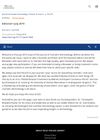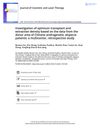 581 citations,
February 1998 in “The American Journal of Medicine”
581 citations,
February 1998 in “The American Journal of Medicine” Herbal remedies can cause adverse effects and need more safety research.
 53 citations,
September 2020 in “Stem Cell Research & Therapy”
53 citations,
September 2020 in “Stem Cell Research & Therapy” New methods to improve the healing abilities of mesenchymal stem cells for disease treatment are promising but need more research.
 January 2020 in “Der Pharmacia Lettre”
January 2020 in “Der Pharmacia Lettre” Nanoparticle-based herbal remedies could be promising for treating hair loss with fewer side effects and lower cost, but more research is needed.

Some TikTok hair loss remedies like rosemary oil, onion juice, and garlic gel show promise, but more research is needed and they might delay proper treatment.
 2 citations,
January 2014 in “Springer eBooks”
2 citations,
January 2014 in “Springer eBooks” The book details skin conditions in older adults, their link to mental health, cancer treatment importance, hair loss remedies, and managing autoimmune and itchy skin.

Arabica coffee pulp extract may help prevent hair loss and promote hair growth.
 3 citations,
April 2016 in “Food Science and Biotechnology”
3 citations,
April 2016 in “Food Science and Biotechnology” Oriental melon leaf extract may help hair grow and keep it in the growing phase longer.
 81 citations,
June 2010 in “Journal of Dermatological Treatment”
81 citations,
June 2010 in “Journal of Dermatological Treatment” The document concludes that minoxidil and finasteride are proven for hair growth, herbal remedies show promise, but more research is needed to confirm their effectiveness.
 31 citations,
May 2008 in “Drug Discovery Today: Disease Mechanisms”
31 citations,
May 2008 in “Drug Discovery Today: Disease Mechanisms” Different hair growth problems are caused by genetic issues or changes in hair growth cycles, and new treatments are being developed.
 17 citations,
October 2015 in “Medicine and Pharmacy Reports”
17 citations,
October 2015 in “Medicine and Pharmacy Reports” Animal models are crucial for learning about hair loss and finding treatments.
 November 2023 in “Skin appendage disorders”
November 2023 in “Skin appendage disorders” Public interest in oral minoxidil for hair loss increased after a New York Times article.
 2 citations,
April 2021 in “Journal of Cosmetic Dermatology”
2 citations,
April 2021 in “Journal of Cosmetic Dermatology” Hair loss lowers young men's self-esteem, increasing social anxiety and affecting daily life.
 17 citations,
November 2012 in “Maturitas”
17 citations,
November 2012 in “Maturitas” The conclusion is that proper evaluation and treatment of hair loss in midlife women is important, considering the emotional impact and potential for various treatments.
 10 citations,
January 2010 in “PubMed”
10 citations,
January 2010 in “PubMed” Adjuvants, diet changes, and laser therapy may improve male pattern hair loss.
 2 citations,
July 2022 in “Cell Regeneration”
2 citations,
July 2022 in “Cell Regeneration” Understanding hair growth involves complex factors, and more research is needed to improve treatments for hair loss conditions.
 3 citations,
May 2018 in “InTech eBooks”
3 citations,
May 2018 in “InTech eBooks” Animal models, especially mice, are essential for advancing hair loss research and treatment.
 10 citations,
July 2018 in “Our Dermatology Online”
10 citations,
July 2018 in “Our Dermatology Online” Some vitamins and minerals are important for preventing hair loss, but treating hair loss with them without a known deficiency is not proven effective.
 42 citations,
March 2006 in “Drug Discovery Today: Therapeutic Strategies”
42 citations,
March 2006 in “Drug Discovery Today: Therapeutic Strategies” The conclusion is that we need more effective hair loss treatments than the current ones, and these could include new drugs, gene and stem cell therapy, hormones, and scalp cooling, but they all need thorough safety testing.
 July 2019 in “Journal of Cosmetic Dermatology”
July 2019 in “Journal of Cosmetic Dermatology” The July 2019 journal had articles on rosacea treatment and herbal hair loss remedies.
 April 2020 in “Journal of Cosmetic and Laser Therapy”
April 2020 in “Journal of Cosmetic and Laser Therapy” Optimal transplant density for Chinese male hair loss patients is 35-50 hair/cm², with minimum 106.88 hair/cm² left in donor area for esthetic satisfaction.
 5 citations,
January 2017 in “Journal of Nanomedicine & Nanotechnology”
5 citations,
January 2017 in “Journal of Nanomedicine & Nanotechnology” Nanoemulgel could be a promising new treatment for hair loss.
 3 citations,
February 2005 in “Expert Opinion on Investigational Drugs”
3 citations,
February 2005 in “Expert Opinion on Investigational Drugs” New treatments for hair loss are being developed using molecular biology.
 21 citations,
October 2009 in “Biochemical Engineering Journal”
21 citations,
October 2009 in “Biochemical Engineering Journal” Stem cell therapy is a promising approach for hair regrowth despite potential side effects.
 2 citations,
September 2013 in “Journal of Cosmetic Dermatology”
2 citations,
September 2013 in “Journal of Cosmetic Dermatology” Hair restoration combines drugs and follicular unit grafting for natural, long-lasting results.
 34 citations,
July 2011 in “Journal of Dermatological Treatment”
34 citations,
July 2011 in “Journal of Dermatological Treatment” Curcuma aeruginosa extract combined with minoxidil effectively treats male-pattern baldness.
 September 2016 in “Princeton University Press eBooks”
September 2016 in “Princeton University Press eBooks” The document concludes that understanding health requires considering evolutionary perspectives on reproductive fitness, and recognizing the complexity of factors like diet, testosterone, and sexual orientation.
 2 citations,
October 2015 in “Indian journal of science and technology”
2 citations,
October 2015 in “Indian journal of science and technology” SM-215 promotes hair growth by improving the environment around hair follicles.
 3 citations,
January 2016 in “Annals of Dermatology”
3 citations,
January 2016 in “Annals of Dermatology” Minoxidil was the most effective treatment for hair regrowth in rats compared to Aminexil or Kerium.
 73 citations,
March 2010 in “Food and Chemical Toxicology”
73 citations,
March 2010 in “Food and Chemical Toxicology” Zizyphus jujuba essential oil can promote hair growth.
 106 citations,
April 2013 in “Dermatologic Surgery”
106 citations,
April 2013 in “Dermatologic Surgery” Low-level light therapy safely improves hair growth and thickness for androgenetic alopecia.






























